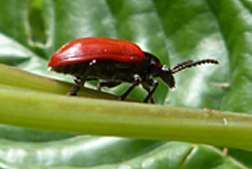Beetles used as biological control against invasive exotic plant in Florida

(Phys.org)—U.S. Department of Agriculture (USDA) scientists teamed with Broward County students today to release beneficial beetles that are proving to be an effective biological control against the air potato vine, an aggressive, invasive exotic plant that is displacing native plant species and disrupting ecological functions throughout Florida. The event at the Long Key Natural Area and Nature Center was hosted by the Agricultural Research Service (ARS), the chief intramural scientific research agency of USDA.
Scientists from ARS' Invasive Plant Research Laboratory (IPRL) at Fort Lauderdale, Fla., and the students released air potato leaf beetles (Lilioceris cheni) in an area infested by the vine, and visited a nearby beetle establishment site to observe the beneficial impact of the biocontrol program. Sixteen beetles released on March 1, 2012, produced thousands of offspring which have caused nearly complete defoliation of the plants in the release area.
ARS' partners in the battle against the air potato vine included the Florida Fish and Wildlife Conservation Commission, which funded the project; the Florida Department of Agriculture and Consumer Services, the Dade County Department of Environmental Resource Management (DERM), the South Florida Water Management District, and Broward County Parks and Recreation.
Today's beetle release resulted from ARS research on environmentally friendly ways to combat air potato vine, with support on the final collections of the beetle in southern China by ARS' Australian Biological Control Laboratory. The vine takes its name from the potato-like aerial formations it produces during late summer. Each of these formations can weigh up to two pounds. The vine has been found in most of the Gulf Coast States, Puerto Rico, and as far north as the Carolinas.
Air potato vine intermingles with important native plant species, so many traditional approaches used to control weeds, such as use of herbicides, aren't viable options in this case," said Ted Center, research leader at the Fort Lauderdale lab. "Using a biological control agent such as the air potato leaf beetle specifically targets the invasive vine while giving native plants room to grow and become more competitive. Air potato vines die back in the fall and sprout in the spring, but the beetles are able to survive the winter months without food. We think the overwintering beetles will quickly attack new vine sprouts when they appear in the spring.
Center said the laboratory invited the students to participate in the beetle release to stimulate their interest in nature and biology, and to provide them with a deeper understanding of biological control and its benefit to the environment. This activity supports USDA's commitment to the STEM (science, technology, engineering and mathematics) educational pipeline to help develop the scientists who will be needed in the future to ensure U.S. food security, innovation and agricultural sustainability for years to come.
The ARS laboratory conducts research into the impact of exotic plants as well as the safety and effectiveness of biological control and other methods used to manage invasive plants. The laboratory also collaborates with the public, land management organizations, other government agencies, and the scientific community on all aspects of exotic plant management.
Provided by Agricultural Research Service



















